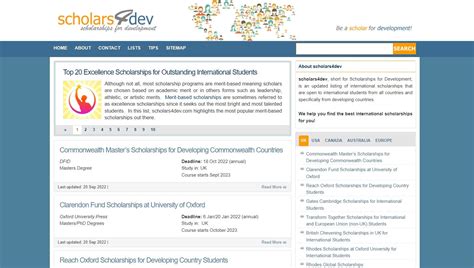
Higher education plays a pivotal role in empowering developing countries, yet many face challenges in accessing quality education. Scholars4dev, a global initiative, addresses this problem by providing support and resources to universities and students in these regions. With a mission to promote equitable access to knowledge, Scholars4dev seeks to transform the higher education landscape and empower the next generation of leaders in developing countries.
Scholars4dev’s Mission and Vision
Scholars4dev is a non-profit organization dedicated to empowering higher education in developing countries. Founded in 2009, Scholars4dev believes that access to quality higher education is essential for sustainable development.
The organization’s mission is to “unlock the potential of higher education to transform developing countries.” Scholars4dev envisions a world where all students in developing countries have access to the resources and support they need to succeed in higher education and become leaders in their communities.
Scholars4dev’s Values
Scholars4dev’s core values guide its work:
- Equity: Scholars4dev believes that all students deserve access to quality higher education, regardless of their background or circumstances.
- Excellence: Scholars4dev is committed to providing the highest quality educational experiences for its students.
- Innovation: Scholars4dev embraces innovation to find new and effective ways to empower higher education in developing countries.
- Collaboration: Scholars4dev believes in the power of collaboration to achieve its mission. The organization partners with universities, governments, and other organizations to create a supportive environment for higher education.
- Sustainability: Scholars4dev is committed to building sustainable solutions that will empower higher education in developing countries for generations to come.
The Importance of Higher Education in Development
Higher education plays a critical role in sustainable development. Educated individuals are more likely to:
- Be employed and earn higher incomes.
- Be healthier and have longer lives.
- Be engaged in civic and political life.
- Make informed decisions about their lives and communities.
In developing countries, higher education is particularly important. It can help to break the cycle of poverty, create new opportunities for economic growth, and improve the overall quality of life for individuals and communities.
The Benefits of Higher Education for Developing Countries
The benefits of higher education for developing countries are numerous. These benefits include:
- Increased economic growth: Educated individuals are more likely to be employed and earn higher incomes, which can lead to increased economic growth for developing countries.
- Reduced poverty: Higher education can help to break the cycle of poverty by providing individuals with the skills and knowledge they need to improve their lives and the lives of their families.
- Improved health and well-being: Educated individuals are more likely to be healthy and have longer lives. They are also more likely to make informed decisions about their health and the health of their families.
- Increased civic and political participation: Educated individuals are more likely to be engaged in civic and political life. They are more likely to vote, run for office, and participate in community organizations.
- Improved decision-making: Educated individuals are more likely to make informed decisions about their lives and communities. They have the skills and knowledge to analyze information, weigh options, and make decisions that are in their best interests.
Challenges Faced by Higher Education in Developing Countries
Higher education in developing countries faces a number of challenges, including:
- Lack of access: Many students in developing countries do not have access to quality higher education. This is due to a number of factors, including poverty, distance, and cultural barriers.
- Poor quality: Even when students do have access to higher education, the quality of the education they receive is often poor. This is due to a number of factors, including underfunded universities, poorly trained faculty, and outdated curricula.
- Inadequate funding: Higher education in developing countries is often underfunded. This makes it difficult for universities to provide quality education and support services to their students.
- Brain drain: Many of the best and brightest students in developing countries leave their home countries to study abroad. This can lead to a brain drain, which can further weaken the higher education system in developing countries.
The Impact of Challenges on Higher Education in Developing Countries
The challenges faced by higher education in developing countries have a significant impact on the ability of these countries to achieve sustainable development. Lack of access to quality higher education can lead to:
- Economic stagnation: Developing countries cannot achieve sustainable economic growth without a well-educated workforce.
- Persistent poverty: Poverty is more likely to persist in countries with low levels of educational attainment.
- Poor health and well-being: Lack of education can lead to poor health and well-being, which can have a negative impact on individuals and communities.
- Weak civic and political participation: Lack of education can lead to low levels of civic and political participation, which can make it difficult for developing countries to achieve democratic governance.
- Poor decision-making: Lack of education can lead to poor decision-making, which can have a negative impact on individuals, communities, and countries.
Scholars4dev’s Approach to Empowering Higher Education
Scholars4dev’s approach to empowering higher education in developing countries is based on the belief that all students deserve access to quality higher education, regardless of their background or circumstances.
The organization works to achieve its mission through a variety of programs and initiatives, including:
- Scholarships: Scholars4dev provides scholarships to students from developing countries who demonstrate financial need and academic merit.
- Mentoring: Scholars4dev provides mentors to students from developing countries who are studying abroad.
- Capacity building: Scholars4dev provides capacity building programs to universities in developing countries to help them improve the quality of their education.
- Policy advocacy: Scholars4dev advocates for policies that support higher education in developing countries.
Scholars4dev’s Holistic Approach
Scholars4dev’s approach to empowering higher education is holistic. The organization recognizes that the challenges facing higher education in developing countries are complex and interconnected.
Scholars4dev’s programs and initiatives are designed to address the root causes of these challenges and to create a sustainable foundation for higher education in developing countries.
Scholars4dev’s Programs and Initiatives
Scholars4dev’s programs and initiatives are designed to address the challenges facing higher education in developing countries and to empower students and universities to succeed.
The organization’s core programs include:
- Scholarships: Scholars4dev provides scholarships to students from developing countries who demonstrate financial need and academic merit. The scholarships cover the cost of tuition, fees, and living expenses, and they also provide students with access to mentoring and other support services.
- Mentoring: Scholars4dev provides mentors to students from developing countries who are studying abroad. The mentors provide guidance and support to the students, helping them to adjust to their new environment and to succeed in their studies.
- Capacity building: Scholars4dev provides capacity building programs to universities in developing countries to help them improve the quality of their education. The programs cover a range of topics, including curriculum development, faculty training, and institutional management.
- Policy advocacy: Scholars4dev advocates for policies that support higher education in developing countries. The organization works with governments, international organizations, and other stakeholders to promote policies that increase access to quality higher education and improve the quality of education.
Scholars4dev’s Impact and Success Stories
Scholars4dev’s programs and initiatives have had a significant impact on the lives of students and universities in developing countries.
The organization’s scholarships have helped to:
- Increase access to higher education for students from disadvantaged backgrounds.
- Improve the quality of education for students in developing countries.
- Reduce the brain drain by encouraging students to return to their home countries after completing their studies.
Scholars4dev’s mentoring program has helped to:
- Provide guidance and support to students from developing countries who are studying abroad.
- Increase the retention rates of students from developing countries.
- Help students from developing countries to succeed in their studies and careers.
Scholars4dev’s capacity building programs have helped to:
- Improve the quality of education at universities in developing countries.
- Increase the capacity of universities in developing countries to train

